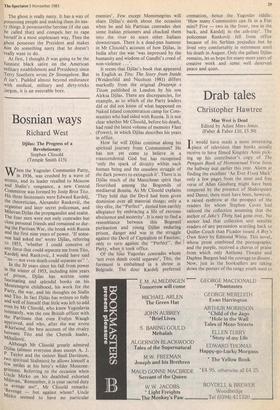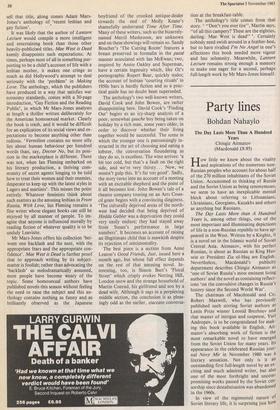Drab tales
Christopher Hawtree
Mae West is Dead Edited by Adam Mars-Jones (Faber & Faber f10, £3.50)
It would have made a more interesting piece of television than books usually receive to have filmed Kingsley Amis pick- ing up his contributor's copy of The Penguin Book of Homosexual Verse from the hallway mat earlier this year. Alarm at finding the excellent 'An Ever-Fixed Mark' only a few pages from the smut and free verse of Allen Ginsburg might have been tempered by the presence of Shakespeare and Dante; there must have been, however, a raised eyebrow at the prospect of the readers for whom Stephen Coote had tailored the collection assuming that the author of Jake's Thing had gone over. No sooner had that collection Sent sensible readers of any persuasion scuttling back to Quiller-Couch than Picador issued A Boy's Own Story by Edmund White. This novel, whose prose combined the pornographic and the purple, received a chorus of praise from which only Anthony Thwaite and Daphne Burgess had the courage to dissent. Now, just as the booksellers are taking down the posters of the rangy youth used to
sell that title, along comes Adam Mars- Jones's anthology of 'recent lesbian and gay fiction'.
It was likely that the author of Lantern Lecture would compile a more intelligent and entertaining book than those other heavily-publicised titles. Mae West is Dead keenly disappoints such expectations. At times, perhaps most of all in something pur- porting to be a child's,account of life with a lesbian mother, it makes one cringe as much as did Hollywood's attempt to deal seriously with the 'problem' in Making Love. The anthology, which the publishers have produced in a way that satisfies war economy standards, comes with a 30-page introduction, 'Gay Fiction and the Reading Public', in which Mr Mars-Jones analyses at length a thriller written deliberately for the American homosexual market. Clearly the book is trash, and it would be difficult for an explication of its social views and ex- pectations to become anything other than tedious. ' Vermilion contains no more silly lies about human behaviour per hundred words than, say, Doctor No, but its posi- tion in the marketplace is different. There was not, when Ian Fleming embarked on his literary production, a thriving com- munity of secret agents longing to be told how to treat their women and their enemies, desperate to keep up with the latest styles in Lugers and martinis'. This misses the point entirely. Whatever feminists think about such matters as the amusing lesbian in From Russia, With Love, Ian Fleming remains a fine writer whose elegant books can still be enjoyed by all manner of people. To im- agine that anyone is influenced morally by reading fiction of whatever quality is to be unduly Leavisite.
Mr Mars-Jones offers his collection 'bet- ween one backlash and the next, with the appropriate fears and the appropriate con- fidence'. Mae West is Dead is further proof that to approach writing by its subject- matter is foolish; rather than advocating the 'backlash' so melodramatically assumed, most people have become weary of the topic. Some homosexual authors have published novels this season without feeling the need to raise the subject and this an- thology contains nothing as funny and as brilliantly observed as the Japanese boyfriend of the crooked antique-dealer towards the end of Molly Keane's shamefully underrated Time After Time. Many of these writers, such as the bizarrely- named Merril Mushroom, are unknown and on these showings will remain so. Sandy Boucher's 'The Cutting Room' features a breast preserved in formalin in the passe manner associated with Ian McEwan; two, inspired by Annie Oakley and Superman, have a certain ingenuity which, like Oz's pornographic Rupert Bear, quickly stales; the account of lesbian 'courting rituals' in 1950s bars is hardly fiction and as a prac- tical guide has no doubt been superseded.
The anthology's two well-known writers, David Cook and John Bowen, are rather disappointing here. David Cook's 'Finding Out' begins as an icy-sharp analysis of a poor, somewhat gauche boy being taken on holiday by a rich man, some years older, in order to discover whether their living together would be successful. The scene in which the younger one is patronisingly in- structed in the art of choosing and eating a lobster, the conversation floundering as they do so, is excellent. The wine arrives: 'a bit too cold, but that's a fault on the right side, and we're very thirsty... Now, we mustn't gulp this. It's far too good'. Sadly, the story turns into an account of a meeting with an excitable shepherd and the point of it all becomes lost. John Bowen's tale of a theatre company touring on an Arts Coun- cil grant begins with a convincing dinginess. 'The culturally deprived areas of the north- west had decided that being deprived of Hedda Gabler was a deprivation they could very easily endure; they had stayed away from Susan's performance in large numbers'. It becomes an account of raising an illegitimate child that is mawkish despite its rejection of sentimentality.
The best piece is a section from Anne Leaton's Good Friends, Just, issued here a month ago, but whose full effect 'depends on the rest of that amusing novel. In- teresting, too, is Simon Burt's 'Floral Street' which crisply evokes Notting Hill, London snow and the strange household of Martin Conrad, his girlfriend and son by a dead wife. Although it sags in a perplexing middle section, the conclusion is as pleas- ingly odd as the earlier, staccato conversa-
tion at the breakfast-table.
The anthology's title comes from that story. "Don't you ever tire", Martin says, "of all this campery? These are the eighties, darling. Mae West is dead" '. Certainly nobody need swish around in a feather-boa, but to have rivalled I'm No Angel in one's affections this book needed more vigour and less solemnity. Meanwhile, Lantern Lecture remains strong enough a memory to make one eager for a second, perhaps full-length work by Mr Mars-Jones himself.















































 Previous page
Previous page